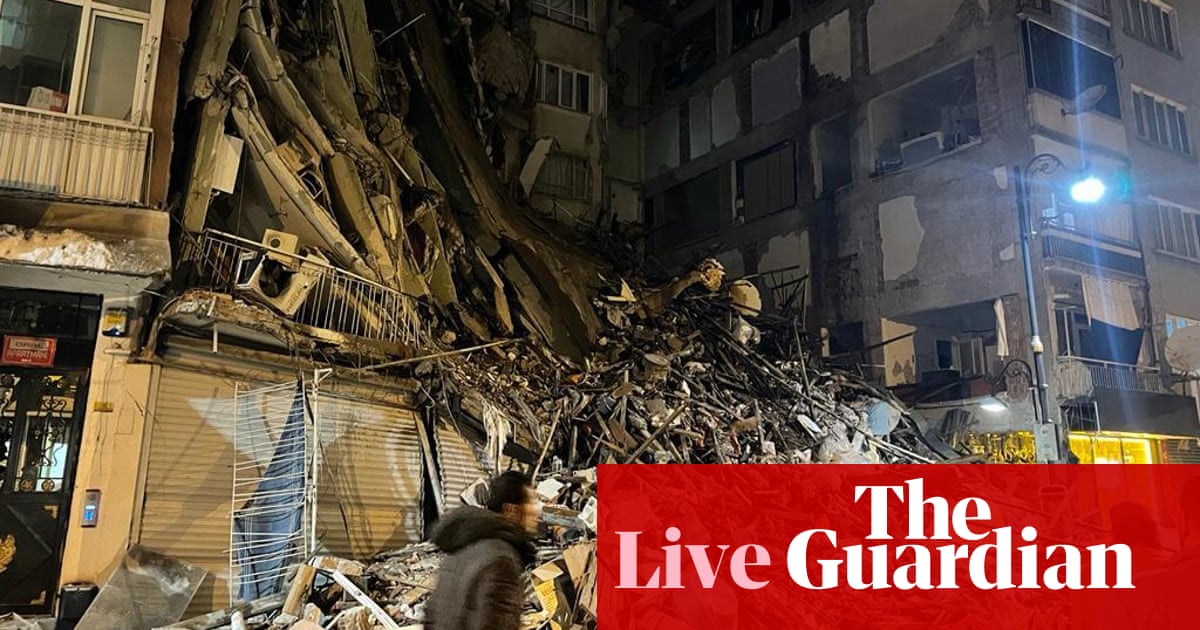(The Guardian) 7:01am Summary
--The combined death toll from Monday’s earthquake which struck Syria and Turkey has now reached 11,416, as rescue efforts continued across the region, despite being hampered by cold weather conditions.
--Turkey’s president Recep Tayyip Erdoğan announced that the death toll from Monday’s quake had reached 8,754 in Turkey. Visiting Kahramanmaraş, which was at the epicentre of the quake, he said “On the first day we experienced some issues, but then on the second day and today the situation is under control”. Erdoğan promised the government aims to build housing within one year for those left without a home in the 10 provinces affected.
--The death toll in Syria has risen to 2,662, according to reports from AFP. Syria’s government has received help from a host of Arab countries including Egypt and Iraq, as well as from its key ally Russia, which has sent rescue teams and deployed forces already in Syria to join relief work, including in Aleppo.
--Syria has activated the EU civil protection mechanism, two days after the earthquake, to request further assistance from the 27-country bloc and the eight other nation states that are part of the programme. The European Union has has already mobilised search and rescue teams to help Turkey, while the bloc’s Copernicus satellite system has been activated to provide emergency mapping services. At least 19 member countries have offered assistance.
--Cold weather continues to be expected in the region with minimum and maximum temperatures for Kahramanmaraş today of -6C and 1C (21-34F), and for Gaziantep between -5C and 1C (23-34F). Diyarbakır is expected to have continued snowfall, with temperatures climbing to 2C (35F) at most.
--A container blaze at Turkey’s southern port of Iskenderun has been brought under control, Turkey’s maritime authority said on Wednesday, following combined extinguishing efforts from land, sea and air. The blaze started when containers were toppled during the quake.
--Pope Francis offered his prayers for the thousands of victims of the earthquake in Syria and Turkey and called on the international community to continue to support rescue and recovery efforts.
--In the UK, the newly appointed chair of the ruling Conservative party said the country would be ready to respond to any further requests from Turkey for support.
--Kenan Akbayram, a geologist at the University of Bingöl, said it is difficult to predict how long aftershocks might continue, adding that the 2020 earthquake in the eastern city of Elazig, which registered at a magnitude of over 6, still has its own aftershock sequences which his team of scientists have observed.
--Three British nationals are missing after the earthquake, the UK’s foreign secretary said on Tuesday. “We assess that the likelihood of large-scale British casualties remains low,” James Cleverly said.
--Four Australians are unaccounted for following the earthquakes. Australia’s foreign affairs department is providing consular assistance to the families of the nationals who were where the catastrophe struck and to about 40 other Australians and their families who were also in the area.
--Satellite images released by Maxar Technologies give an idea of the scale of the challenge for emergency crews over the coming days. They show in vivid detail the breadth of the destruction that has unfolded in towns, cities and villages across the region.





